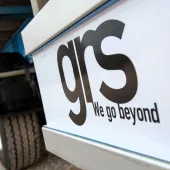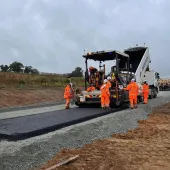Tarmac call for greater use of warm-mix asphalt

Company says new thinking needed to reduce disruption caused by roadworks as traffic levels rise
TARMAC have called for new thinking in road construction and greater use of warm-mix asphalt to reduce disruption from roadworks, as a new survey commissioned by the company shows people believe traffic levels across the UK are almost back to pre-pandemic levels.
Nearly two thirds of motorists are making the same number of car journeys (or more) than prior to lockdown, and 41% are now travelling far more than they did just a few months ago.
Essential roadworks play a key role in getting people moving but alongside the freedom to travel also comes the frustration of additional traffic delays, with 73% of those surveyed saying that their travel had been impacted by roadworks.
Further to this, the survey also revealed that 71% of drivers believe traffic levels are the same or higher than pre-lockdown levels, with almost a quarter having been stationary in traffic for up to 20mins per journey since lockdown restrictions were lifted.
To ease the problem, Tarmac are encouraging local authorities across the country to embrace new thinking in road building and repair through the increased use of warm-mix asphalt to help get traffic moving more quickly.
The solution involves laying asphalt at lower temperatures than traditional mixes, which means it can be laid faster, sets quicker, is much more sustainable to produce and allows roads to reopen and get traffic moving more quickly – which will become increasingly important as people start to travel again.
As the Government continues to outline its plans to build back better and greener, with £100 million set aside for road repairs and improvements, Tarmac are calling on local authorities across the country to take action and help both the environment and road users by adopting warm-mix asphalt as the default method of road paving.
Warm-mix asphalt is quick and easy to lay and requires less cooling time between courses, increasing the amount of material that can be laid in a standard shift – saving time and money.
It is estimated that this method of road building and repair could save 60,000 tonnes of CO2 per year nationally, the equivalent of 300 million miles of car journeys*, and offers significant public health benefits in terms of clean air.
Despite these benefits, a report from the All-Party Parliamentary Group (APPG) for Highways has stated that the widespread adoption of warm-mix asphalt has so far failed to take place. The report notes that adoption of warm-mix asphalt in the UK currently stands at less than 4%, lagging far behind the US (40%) and France (15%).
Brian Kent, national technical director at Tarmac, said: ‘As we begin our road to recovery from the COVID-19 pandemic, it has never been more important for the construction industry to work together with local authorities and councils to adopt more sustainable ways of working.
‘With carbon reduction at the centre of the Government’s Construction Strategy and many local authorities working to achieve net zero targets by 2030, warm-mix asphalt is a proven materials technology that benefits road users, residents living around areas of roadworks, highways workforce who spend less time exposed to traffic during roadworks, and the environment.’
*‘Working for better roads - Warm Mix Asphalt: reducing carbon emissions and improving efficiencies’ report issued by The All-Party Parliamentary Group on Highways, September 2019.









